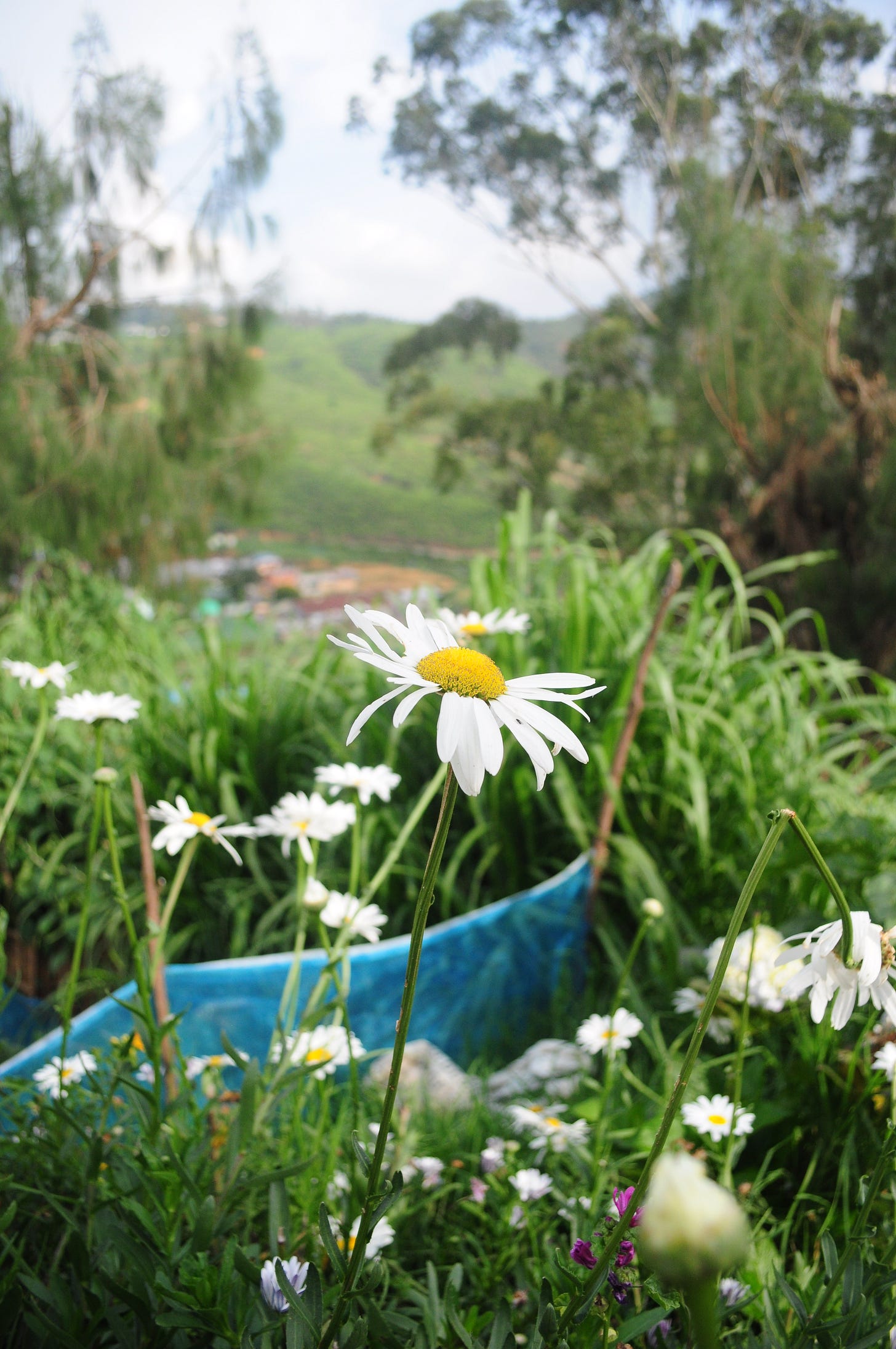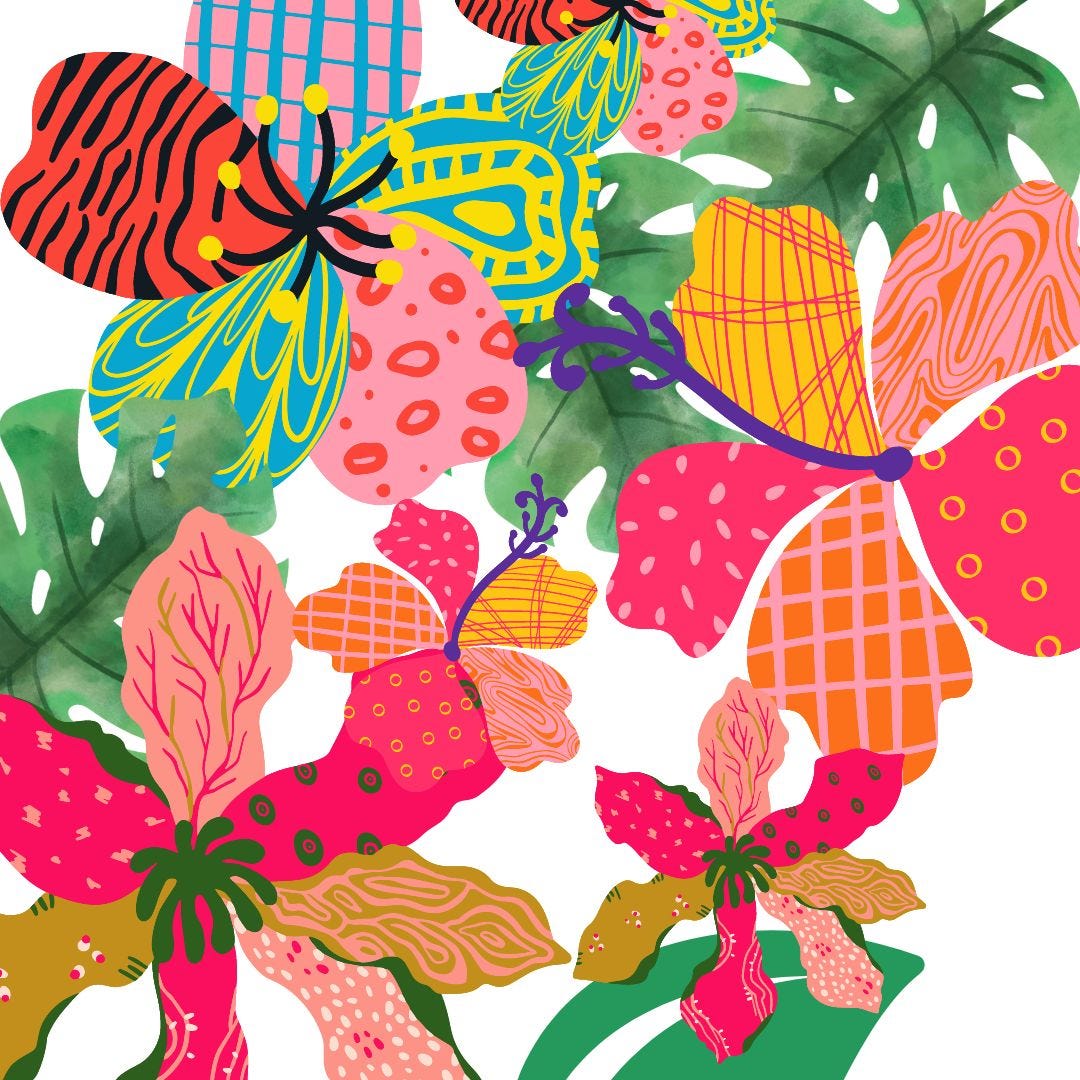I would not tell my daughter to be a flower. To be admired for a short season. To have hidden roots and careful depth that no one can see. Useful pollen and pretty petals which are quickly discarded.
If I had a daughter, I would teach her to be like the earth itself. To be messy, solid, firm. I would show her how to take up space so that she cannot be ignored. To let life wildly take root inside of her, so that she becomes the mountains, a riot of trees, fields of grain. I would tell her to root so deep, that even when they dig, they cannot uproot her. So she can shape a world in which she can flourish.
It has taken me much of March to process International Women’s Day this year. I felt angry and alone - torn between feeling like I should support other women and the realisation that (against the spirit of the day) it seemed like so many women still see equality as an individual rather than a collective journey.
I also felt angry at some men (which was more acceptable to say out loud) and particularly angry at men who used the day as a way to draw attention to themselves, without framing their shoutouts or floral gifts within a discourse of structural change.
I felt angry at the women who endorsed these men’s tokenistic support of a conversation that I have had no option to opt in or out of - a conversation so deeply woven into my life that I cannot separate myself from it.
I was saddened that a day with its foundation in workers’ rights seemed to increasingly be sanitised to fit into corporate cultures. Discussions were adjusted so that they were comfortable, instead of centred on women’s lived experiences - which do not fit easily into corporate policies.
While I know there must have been constructive and uplifting conversations going on somewhere, that was not what I saw. Instead, I witnessed a man receive a round of applause, celebrated ‘as brave for speaking at an event about women’. I heard women tell other women to take on more personal responsibility, to try harder, give more and struggle - unaware of the way that women’s power is often found in unpicking these very same shaming narratives.
I tuned into an inspirational speech in which a woman suggested other women would be more empowered if they volunteered more (ignoring the existing, well-documented, unpaid daily labour which is shouldered by women). I felt like I must admire and celebrate the resilience of women, who have thrived within the capitalist patriarch’s systems, when I would rather feel safe to be soft, loud, angry, all of me, without risking any loss of success.
Overall, instead of being a day about women’s stories - it was yet another day where women were forced to smile as they accepted roses and shoutouts from people who otherwise do nothing to endorse or support them. A day which did not recognise structural inequity, but rather put the burden again, squarely on ‘other women’, to sort themselves out. Another day of complying and putting up with, rather than one during which we are centred and heard in our diversity and difference.
When I was younger, I believed in the illusion of equality.
I needed to do well at school. Just like my brother.
I thought the gender movement did not impact me. I believed in my competence and fairytales. Until I had breasts which bounced when I walked. Until I had a body which bled. Until I had experiences and opinions which clashed with the stories I had been taught. Until I had a heart that thought it would be loved fairly. Until I had a voice that thought it would be considered. Until I had desires which thought they would be cherished. Until men showed me it was otherwise. Over and over again.
When we unwind our humanity, deep into our psyches: there sits the root. It is embedded and uncomfortable. It is not about hustle or responsibility. It is about systems of power and how they have been woven into us all. They sit in men and women alike.
Instead of acknowledging the complexity of these systems, we are encouraged to adapt. To inhale a sprinkle of inspiration. A little bit of resilience and we are nearly there. When really data suggests we are over 130 years away from gender equality - and that is just on the political, educational and economic. Because to negotiate this ancient story means digging deep. It means looking at ways we have been taught to internalise power so that we do not have it.
The problem with my story is not in its telling. It is my voice telling it. It is my voice saying anything. Even though there are these ancient patterns, people close to me prefer to deny that those patterns have played out over my body and mind. Refuse to see that those patterns have shaped my life.
They prefer to assume there is something wrong with me, rather than to believe that those patterns have been reinforced not by one man, but by many many men. They prefer to assume he was the exception when so often he is the rule. The rule shares our bed with us, he says he loves us, he says he was having a bad day, he says he wants to help us, he says he will beat up other men who hurt us. The rule is always the same rule.
It is still less threatening for our culture to assume that I must be responsible for the consequences of gender inequality than to explore the ways that men - in all areas of my life - have chosen to use their power over me - and the psychological, physical and emotional impact that has had.
It felt like International Women’s Day this year wanted to welcome stories of how I have overcome these obstacles, but not the stories of my wasteland with its ghosts and shadows. Not to consider the ways that I am still haunted. Not to consider how my success and wasteland are inseparately linked. Not to consider how the world has forced me to choose between myself and its systems.
To cast women’s struggles as an exception, not the norm. So women think other women are not trying hard enough. So we do not explore the ways these experiences are systematic or that there are many aspects of power at play - only one of which is gender.
Perhaps all this day did was show where our mainstream global culture sits on women’s rights. Outside of the pockets of community and healing, our culture still largely ignores the histories which shape an unequal world. Only make small concessions. So we continue to uphold old stories rather than shaping a new one which would make the world safe for us all.
It tells us not to be angry. Be inspired.
Show how you are successful and how other women should try harder to be successful too.
Celebrate your resilience.
If my resilience would tell you anything - it would say - pay attention.
Hear your own truth, before the world makes you doubt your knowing.
Nourish your perception, before others tell you, you are being unreasonable.
Let your anger burn into fires we can gather around.
Until we live in a world where equality is so rooted in us, that we can sit at those fires to hear a grandmother tell an ancient story of how the world was unequal, but we pulled it from our bodies. That we were hurt, but we purged it from our hearts. That we were poisoned but we spat it out.
That we were flowers, but now we are the solid sturdy ground.
Thank you for reading Notes from Saving the World.
This is a place to share experiences that connect our personal stories to our collective stories. Our inner journeys to outer journeys and our transformations to bigger global change.
I write about the systems we live in through the lens of my personal and professional experiences of twenty years working in the aid sector.
I hope my stories might help connect your lived experiences to our global narrative. And ultimately - feel a bit less alone.







This whole idea of "trying harder" makes me tired. And you are so right that we can't untangle our individual experience from the collective experience of all women. We can't "try harder" our way toward liberation. We must let our roots talk to each other, our earthen selves. Your idea of being the earth rather than the flower will stay with me for a long time. Thank you.
Catriona thank you for sharing this article with me. Are we the same person??! 😆
Killer article. 💪🏽I found myself nodding 'yup, yup, yup and yes, yes, yes!' all the way through.